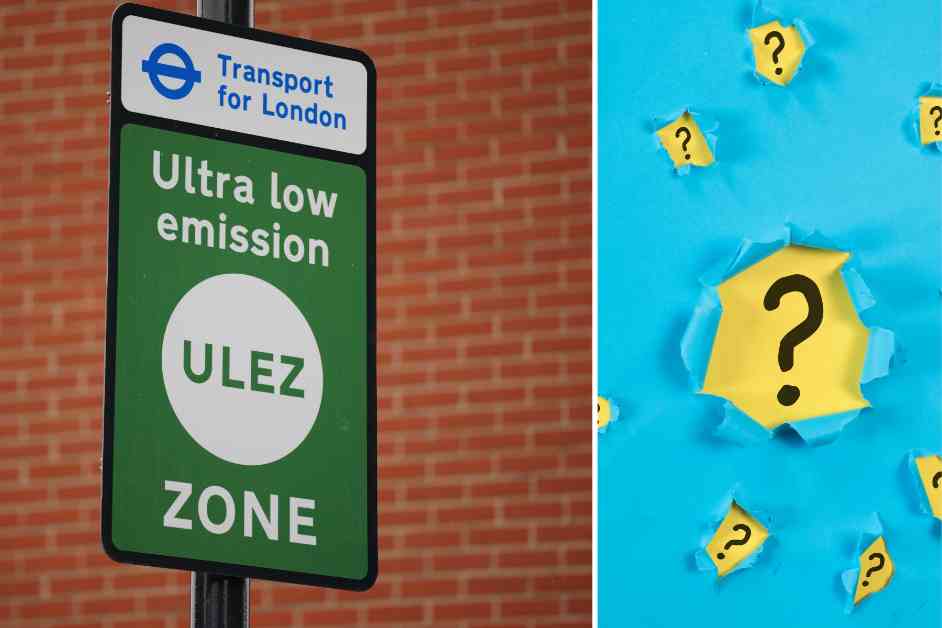The Ultra Low Emission Zone (ULEZ) in London has been a topic of debate and discussion since its expansion across Greater London on August 29, 2023. Created by London Mayor Sadiq Khan in November 2022, the ULEZ aims to tackle air pollution and improve overall health by charging cars that do not meet emission requirements a daily fee of £12.50 to drive in the designated area.
London has been facing challenges with poor air quality, mainly due to polluting vehicles, as highlighted by Transport for London (TfL). The ULEZ expansion was a bold move to address these issues and make a positive impact on the environment and public health.
### Mixed Reactions to the ULEZ Expansion
As the ULEZ expansion approaches its one-year mark, it has elicited a range of responses from Londoners. Some have embraced the initiative, citing improvements in air quality and reduced traffic congestion, while others have expressed frustration and opposition to the scheme.
One local resident who welcomed the ULEZ shared their positive experience, stating, “I have a compliant car and asthma, so I’m quite happy. I ventured into the West End for the first time in years, and the difference in traffic levels was so noticeable.” This sentiment reflects the positive impact the ULEZ has had on reducing pollution and creating a healthier environment in London.
On the other hand, some individuals have voiced their discontent with the ULEZ, with one resident expressing their intention to move away from London due to the restrictions imposed by the scheme. This highlights the challenges faced by those who rely on non-compliant vehicles for their daily transportation needs.
### Evaluating the Effectiveness of the ULEZ Expansion
In response to the mixed reactions from Londoners, Alex Williams, Chief Customer and Strategy Officer at TfL, provided insights into the effectiveness of the ULEZ expansion. He emphasized the significant reduction in NOx pollutants and PM2.5 exhaust emissions resulting from the implementation of the scheme.
According to Williams, the ULEZ has exceeded expectations in terms of its impact on air quality, with NOx pollutants from cars and vans estimated to be 13% and 7% lower, respectively, compared to a scenario without the expansion. This reduction in emissions is equivalent to removing 200,000 cars from the road for one year, demonstrating the tangible benefits of the ULEZ in improving air quality in London.
Furthermore, TfL has implemented a scrappage scheme to assist Londoners, small businesses, and charities in transitioning to cleaner vehicles and greener modes of transport. This initiative has seen significant uptake, with over £186 million committed to around 54,000 applicants, highlighting the willingness of the community to embrace sustainable transportation options.
### Public Perception and Future Outlook
Despite the positive impact of the ULEZ expansion on air quality and emissions reduction, some Londoners remain dissatisfied with the scheme. Calls to abolish the ULEZ and complaints about restrictions on vehicle use continue to be voiced by certain residents, indicating ongoing challenges in achieving widespread acceptance and support for the initiative.
Looking ahead, it is essential for policymakers and stakeholders to engage with the community, address concerns, and explore ways to enhance the effectiveness and inclusivity of the ULEZ. By fostering dialogue and collaboration, London can build a more sustainable and environmentally friendly transportation system that benefits all residents and contributes to a healthier urban environment.
In conclusion, the ULEZ expansion in London has generated a range of reactions and responses from the community, reflecting the complexity and diversity of perspectives on environmental initiatives. While some have embraced the ULEZ for its positive impact on air quality and public health, others have raised concerns about its implementation and impact on daily life. Moving forward, continued dialogue, evaluation, and adaptation of the ULEZ will be crucial in shaping a more sustainable and resilient transportation system for London.





















